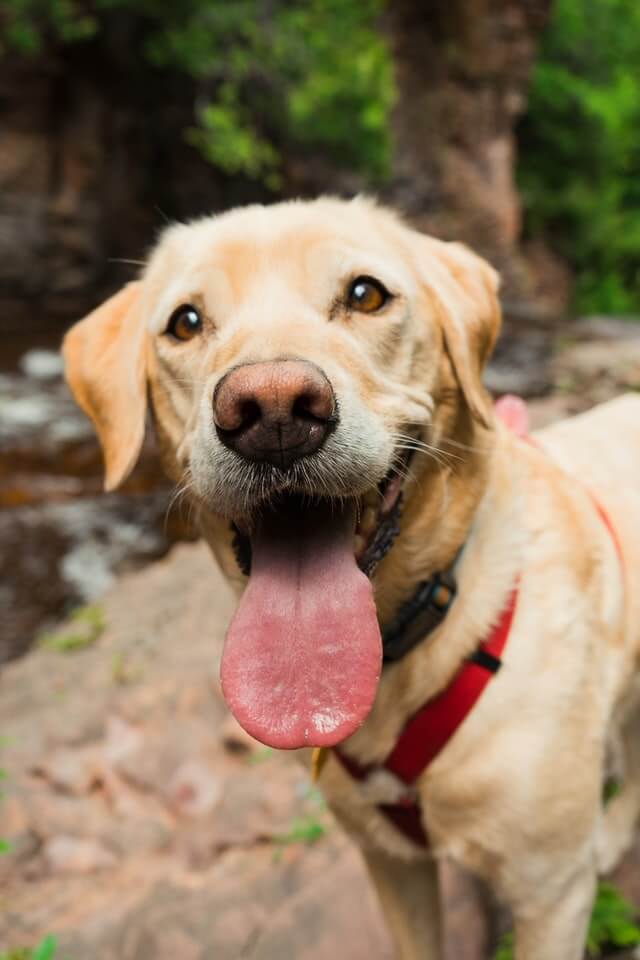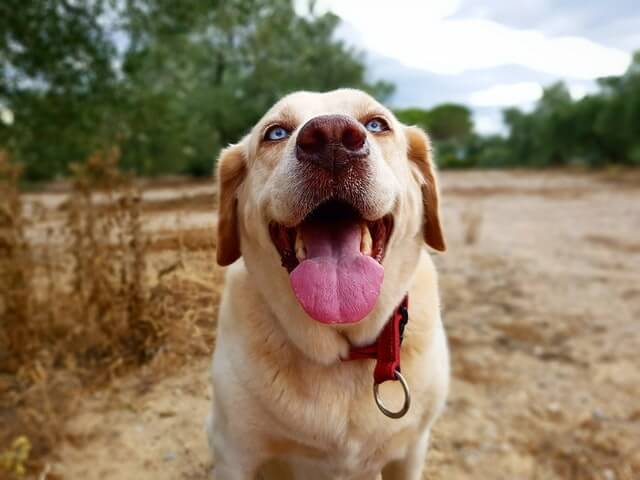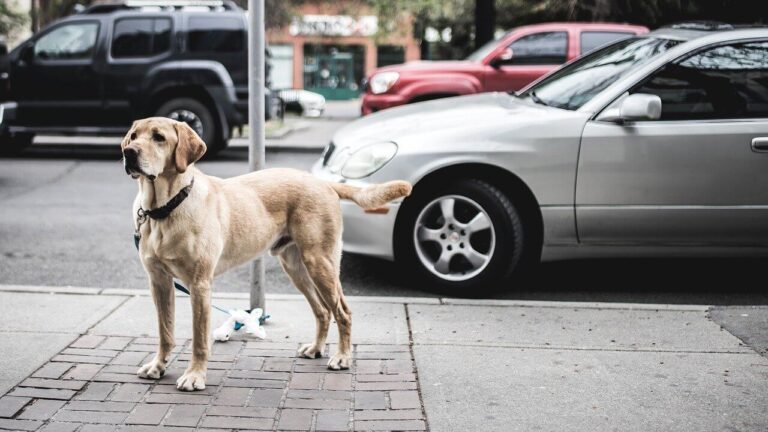When getting a Labrador Retriever, especially a new puppy, sometimes people wonder if this breed of dog is known for barking. Do Labradors bark a lot?
Sometimes dog barking can be hard to deal with if you’re in a quieter neighborhood, have a picky homeowner’s association, or even have young kids that need a quiet nap time that’s not likely to be disturbed by a lot of daily barking.
The answer to the question, “Do Labs bark a lot?” is generally no, they are not known for being extreme or excessive barkers, like some other types of dog breeds.
However, much of this depends on your interaction with your dog and your pup’s individual personality. But as a general rule, Labs are not high-barking types of dogs, unless you want to encourage that and train for it.
(This article may contain affiliate links. As an Amazon Associate I earn from qualifying purchases. Learn more)
We’re going to go into more detail about Labrador barking frequency, some common reasons why you will occasionally hear Labs bark, and strategies to help train your Lab to bark less if you’re finding it’s becoming a problem in your home.
Let’s get started!
Do Labradors Bark a Lot? Solving Lab Barking Issues
Are Labs Frequent Barkers?
Labrador Retrievers are not known to be excessive or frequent barkers, as a dog breed in general.
Labs tend to only bark when necessary, without extreme amounts of barking. You might go many days in a row without hearing a “woof” from them.
This can always vary somewhat based upon the temperament of your individual dog, the amount of training they’ve had, and what circumstances they’ve been exposed to in their environment.
If barking has been encouraged in the past (by you, someone in your home, or by a prior dog owner) you might have a “noisier” Labrador.
We have a Labrador rescue dog who is a very low-barking dog, even among Labs, and he seems to only give us a “once-a-month woof” for usually a very playful reason.
His purebred Labrador sister, who we got as a puppy, is a slightly more frequent barker, but still on the minimal side compared to most dogs.
Let’s look at the reasons you might often hear the occasional bark from your beautiful Labrador.

Common Reasons Why Labradors May Bark
Your Labrador Retriever might bark for a few typical reasons, usually all related to them trying to “communicate” something to their owner.
Here are some of the most common occurrences you might experience as a Lab owner.
Your Lab Wants Your Attention
Labradors often bark to get the attention of their owners or family members. They might be bored, wanting to play, or wanting to “tell” you something.
Labradors usually follow a routine very well, and they might notice if there’s a deviation from that routine.
For example, if you always have Lab dinnertime at 6 pm, and dinner is a little late one particular day, they may come over to you and bark to get your attention.
Labs might also bark for attention if you have treats sitting out on the counter, if you have a human snack you are waiting to give them, or if it’s time to wake up in the morning (and you’re sleeping in).
They won’t typically bark over and over, just generally once or twice in this type of instance to get your attention.
Once they’ve made their point, and gotten your attention, they will usually not bark anymore.
Your Lab Needs to Go Potty Outside
Another reason why Labradors bark sometimes is because they need to go potty outside and they are trying to let you know it’s time.
Labs are very intelligent dogs and fast learners, and when housetrained they often won’t have accidents inside because they want to please their humans.
If crate-trained, Labs often will not go potty in their crates, so they might bark to let you know it’s time to potty and they need to be let out if they are in one.
You might also notice that they go over to the door that leads outside and bark to be let out.
This is something we’ll cover more in the section below, but there are strategies for training your Labrador not to bark when they need to go outside. You can train them to let you know they need to go potty a different way, without the woof!
Your Lab Senses Danger or Something Concerning in Their Environment
Labradors are not usually aggressive or hostile, but they can be very protective of their families and home. You might hear Labrador barking when they detect someone new in their environment or something different.
A ring of the doorbell, a package delivered, or another dog or person walking by your home or on your property will all be likely reasons to hear Lab barking.
Like other dogs, they are pack animals and you, and your family, are part of the pack. Labs will alert you to someone at the door sometimes even before the doorbell rings.

You might also hear them bark in response to something similar on TV (such as a doorbell) or another dog barking.
Sometimes certain sounds outside such as birds chirping, sirens, fireworks, or other loud noises can also trigger dog barking.
This is your Labrador’s way of trying to be helpful and let you know that there’s something causing a disturbance in their environment that they want you to be aware of.
Labradors can be excellent watchdogs and can alert you to things they might find concerning in their home and environment. Whether you find them concerning or not, Labs will often be quick to alert you when they think something’s wrong that you should be aware of.
Your Lab is in a Playful Mood/Playing with Another Dog
Many times a Labrador will bark to communicate with another dog. When playing with other dogs, you will often hear all the dogs barking back and forth with each other.
If you have multiple dogs in your home, the barking can be a bit amplified. This is because sometimes when one starts barking at something, another dog starts barking as well, even when they may not have any idea what started it in the first place!
Your family dogs might start barking at each other as a means of communicating something to the other dog, such as “play with me” or “go away.” This is normal dog behavior and their way of communicating back and forth.
You might also notice your Lab barks in your home at other dogs walking by on the street outside, or at other dogs in the neighborhood while you’re walking them.
This can be a friendly “alert” type of bark, or it can be aggressive to indicate they want this dog to “stay away.”
Generally, a Lab that’s been socialized well and is confident around other dogs will not demonstrate aggression.
If you see this type of aggressive behavior which is uncharacteristic of Labradors, please talk with your vet about it or seek out an animal behaviorist.
When asking the question, “Do Labradors bark a lot?”, sometimes the barking is occurring less during the daytime, and more during sleep!
Let’s take a closer look at sleep-barking in Labradors.
My Lab Barks While Sleeping. What Does This Mean?
Labrador Retrievers can sometimes bark during their sleep, and this can be both hilarious and a bit unnerving.
Research done on dog sleep behavior has found that dogs do sleep in stages similar to humans. In the rapid eye movement stage of sleep (REM), dogs might be deeply sleeping and prone to movement, facial expressions, tail wagging, and yes, barking!
If you’ve ever seen or heard a Labrador barking in their sleep, it is usually a bit muffled because their mouths are mostly closed. You might hear growling, barking, and whining during this doggie-dream stage.
What are Labs dreaming about that is causing them to bark? We don’t have the answer to that, but we can guess that it’s similar things they are responding to while awake: chasing squirrels and bunnies, running with other dogs, perhaps even people coming and going around them.
Sometimes this Lab barking can wake up the humans in the room if your dog sleeps in your room with you. Usually, this Lab sleep-barking is short-lived and will pass quickly.
We’ve even had Labradors wake us up howling in our ears on the bed next to us. It happens!
When Do Lab Puppies Start Barking?
Labrador puppies might begin to bark when they’re still with their litter mates and their mother, around 5-6 weeks. You might hear tiny barks if you’re around the litter and hear the puppies playing with each other.
You might also hear more whining, which is more frequent in tiny Lab puppies than barking is.
These barks are usually not very frequent, nor are they very loud since they’re coming from such tiny, adorable Lab puppies!

As Lab puppies get older, the amount of barking they do depends on their home environment, and whether or not barking is encouraged or trained for.
If you’ve found that, after being in your home for a while, your Lab is barking excessively and you’re wondering if there’s anything you can do to reduce it, we’ll go over some strategies next to help with this problem.
How to Solve Lab Barking Issues
There are some training tips you can utilize to help reduce some of the problem dog barking you might be experiencing in your home.
While there are products such as bark collars that can be purchased, we’re not going to cover them, because there are more positive training methods you can use to help reduce barking in your home.
Let’s go over them now.
Identify the Cause of the Barking
The first step in solving the barking problem with your Lab is to identify as best you can what the triggering event is that usually causes the problem barking.
Is it barking to alert you or protect you? Is it barking to go outside that seems to be the most frequent cause? A ringing doorbell or another barking dog in the neighborhood? Is it barking with excitement to play with another dog you see on your walk?
White noise could help dogs that are easily over-stimulated by distracting noises, and crate time for naps on a schedule might help barking for attention.
If you’re living in a smaller space, such as an apartment or townhome, and you find your Lab is easily bothered by neighborhood noises in close proximity to you, check out our guide to apartment living with Labradors for more strategies to help deal with barking in this type of environment.
Once you identify the events that usually trigger extreme barking, you’ll be better equipped to find the best solution.
Train Your Dog to Ring a Bell at the Door Outside (Instead of Barking)
For dog barking that is triggered by your dog wanting to go outside, you can teach them to use a bell to ring at the door, instead of barking or whining to go out.
To use the bell method, you tie a small bell to whatever door leads to your yard or outside (whatever door you would normally take your dog outside through).
You ring the bell and give your dog a treat after ringing it, then immediately take them outside to go potty. Over the course of a few days, repeat this every time you take your dog out.
Then progress this training by bringing the treat to your dog’s nose at the door, and lead their nose (and treat) right up next to the bell. Then ring the bell and take your dog potty outside. Repeat this several times, every time you go out.
Once your Lab has caught on to this, hold the treat right next to the bell and wait for your Lab to nose the bell (and then reward with the treat). Immediately go potty outside.
Within a few days, your Lab should be bringing their nose up to the bell in the hopes of getting the treat. When they touch it (and ring it, with possibly a little help at first from you), they get rewarded with a treat, then potty outside.
After a few days of treat-rewarding and bell-ringing, your Lab will learn that ringing the bell leads to a treat. Continue to reward them for ringing the bell over the course of the next week or two, gradually and slowly reducing the number of times they get a treat for doing so.
By using this method, you’ll be able to teach your dog to ring the bell to go outside and they’ll be less likely to bark to do so when they know there’s a better method.
Use Training Techniques Such as “Watch Me” for Dog-to-Dog Barking or Outside Barking
If you find that your dog barking is becoming a problem on walks or around other dogs, one training technique that might help is to teach the command, “Watch Me.”
If you’re not familiar with “Watch Me,” it is used to get your dog’s attention focused on you and your face, instead of something distracting or upsetting in their environment.
When you give the “Watch Me” command, your dog will learn to take their eyes off their environment and watch your face instead. By looking away from other distractions, you can redirect them to focus on you.
Teach the “Watch Me” command by having a treat ready, and bringing it up to your face while saying the words, “Watch Me.” Start in a low-distraction environment, such as inside your house, without other dogs or people around.
Repeat 5-10 times for a training session, and then repeat daily. Your Lab should catch on to this technique very quickly.
Then slowly begin to teach “Watch Me” outside in your yard, and then on walks where you might have more distractions. Gradually work up to where your dog can respond to “Watch Me” on walks and when you see other dogs nearby.
If you give your Lab a reason to turn and face you, instead of focusing on the other dog or distraction, you have a better chance of stopping problem barking before it gets out of hand.

Summary – Do Labradors Bark a Lot?
Labs do not usually bark excessively and are not a dog breed that is known for extreme barking.
However, much of this depends on training, your interaction with your dog, and your Lab’s individual personality. But as a general rule, Labs are not high-barking types of dogs, unless you want to encourage that and train for it.
There are many reasons why Labs do bark, such as to get your attention, to warn of strangers in your environment, to play with another dog, or to go potty outside.
If you find that your Lab’s barking is becoming an issue, take some of these training steps to try to help them find another way to communicate with you that does not result in barking. If necessary, talk to your vet or seek a dog behaviorist if your problems can’t resolve themselves.
We want you to enjoy the best life with your Labradors possible, so take a look at the rest of our Tips & Training section for more strategies to help you succeed with your Lab!







